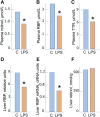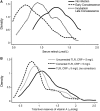Metabolic Effects of Inflammation on Vitamin A and Carotenoids in Humans and Animal Models
- PMID: 28298266
- PMCID: PMC5347109
- DOI: 10.3945/an.116.014167
Metabolic Effects of Inflammation on Vitamin A and Carotenoids in Humans and Animal Models
Abstract
The association between inflammation and vitamin A (VA) metabolism and status assessment has been documented in multiple studies with animals and humans. The relation between inflammation and carotenoid status is less clear. Nonetheless, it is well known that carotenoids are associated with certain health benefits. Understanding these relations is key to improving health outcomes and mortality risk in infants and young children. Hyporetinolemia, i.e., low serum retinol concentrations, occurs during inflammation, and this can lead to the misdiagnosis of VA deficiency. On the other hand, inflammation causes impaired VA absorption and urinary losses that can precipitate VA deficiency in at-risk groups of children. Many epidemiologic studies have suggested that high dietary carotenoid intake and elevated plasma concentrations are correlated with a decreased risk of several chronic diseases; however, large-scale carotenoid supplementation trials have been unable to confirm the health benefits and in some cases resulted in controversial results. However, it has been documented that dietary carotenoids and retinoids play important roles in innate and acquired immunity and in the body's response to inflammation. Although animal models have been useful in investigating retinoid effects on developmental immunity, it is more challenging to tease out the effects of carotenoids because of differences in the absorption, kinetics, and metabolism between humans and animal models. The current understanding of the relations between inflammation and retinoid and carotenoid metabolism and status are the topics of this review.
Keywords: biomarkers; cytokines; infection; retinol; retinol-binding protein; sequestration; urinary loss.
© 2017 American Society for Nutrition.
Conflict of interest statement
Author disclosures: LP Rubin, AC Ross, CB Stephensen, T Bohn, and SA Tanumihardjo, no conflicts of interest.
Figures






References
-
- Krasinski SD, Russell RM, Otradovec CL, Sadowski JA, Hartz SC, Jacob RA, McGandy RB. Relationship of vitamin A and vitamin E intake to fasting plasma retinol, retinol-binding protein, retinyl esters, carotene, alpha-tocopherol, and cholesterol among elderly people and young adults: increased plasma retinyl esters among vitamin A-supplement users. Am J Clin Nutr 1989;49:112–20. - PubMed
-
- Dever J. Host factors: gender and body composition. In: Tanumihardjo SA, editor. Carotenoids and human health. New York: Springer Science and Business Media; 2013. p. 141–52.
-
- Leung WC, Hessel S, Méplan C, Flint J, Oberhauser V, Tourniaire F, Hesketh JE, von Lintig J, Lietz G. Two common single nucleotide polymorphisms in the gene encoding beta-carotene 15,15′-monoxygenase alter beta-carotene metabolism in female volunteers. FASEB J 2009;23:1041–53. - PubMed
-
- Fernández-Real JM. Genetic predispositions to low-grade inflammation and type 2 diabetes. Diabetes Technol Ther 2006;8:55–66. - PubMed
-
- Kaulmann A, Bohn T. Carotenoids, inflammation, and oxidative stress–implications of cellular signaling pathways and relation to chronic disease prevention. Nutr Res 2014;34:907–29. - PubMed
Publication types
MeSH terms
Substances
Grants and funding
LinkOut - more resources
Full Text Sources
Other Literature Sources
Medical

